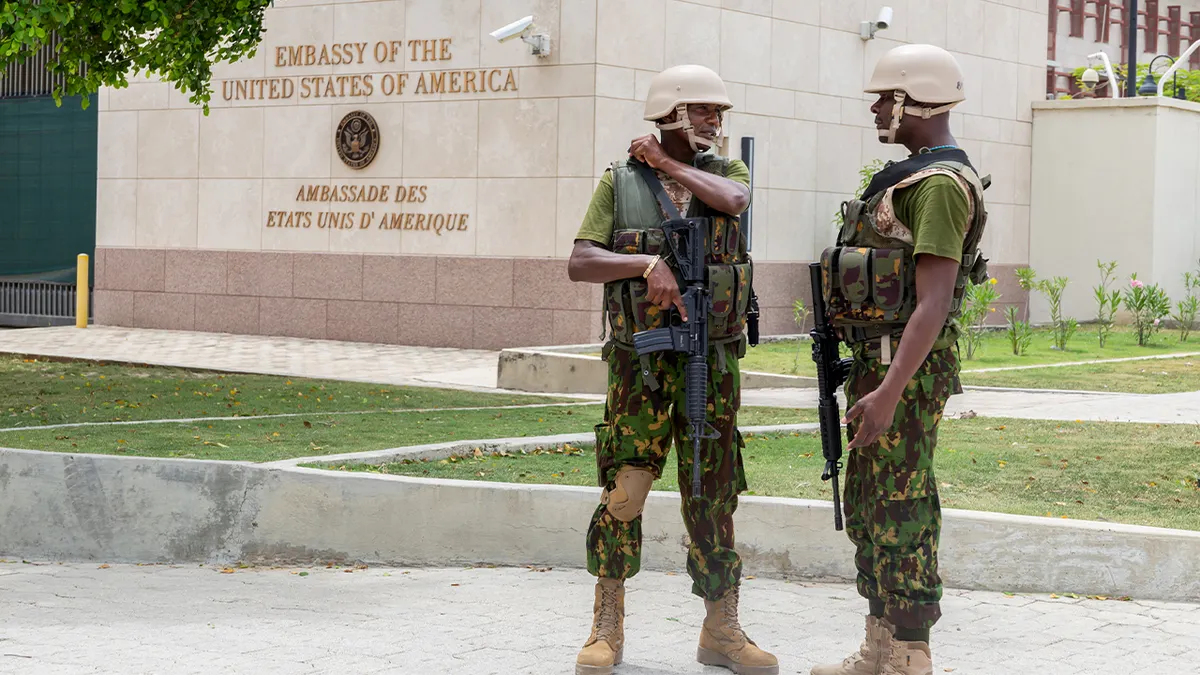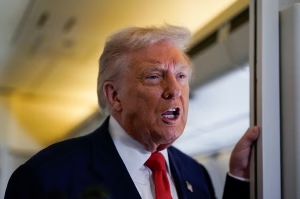The recent exchange of gunfire between U.S. Marines and suspected gang members outside the American embassy in Port‑au‑Prince underscores the profound security crisis confronting Haiti. The incident illustrates both the immediate risks faced by diplomatic personnel and the broader challenges confronting Haitian authorities and international partners as they seek to restore order in a capital increasingly dominated by armed groups.
The Embassy Incident
U.S. Marines assigned to embassy security came under fire from suspected gang members in Port‑au‑Prince. According to Marine Corps officials, the troops returned fire, and no Marines were harmed during the exchange. The incident has been widely regarded as one of the most serious attacks on U.S. personnel in Haiti in recent years and highlights how embassies can become flashpoints when the host country struggles to maintain control over its own territory.
While precise details regarding the number of assailants, their identity, or whether any were injured have not been publicly disclosed, the encounter drew attention to the vulnerability of diplomatic missions in regions experiencing high levels of organized criminal activity.
Gang Influence and Control in Port‑au‑Prince
Haiti’s capital has long faced challenges related to criminal violence, but recent assessments suggest that gangs now control significant portions of Port‑au‑Prince. These groups exert influence over local neighborhoods, manage access to critical roads, and collect informal “taxes” or protection fees from residents and businesses. The United Nations has indicated that armed groups control a substantial share of the city, creating parallel governance structures that undermine state authority.
Gangs operate as multifaceted organizations that extend beyond simple criminal enterprises. Their presence affects social, economic, and political life, creating conditions in which everyday activities, including access to education, healthcare, and employment, are directly influenced by armed groups. Residents in affected areas face threats ranging from extortion to violence, with the state often unable to enforce basic law and order.
Political and Institutional Fragility
Haiti’s security crisis is closely intertwined with ongoing political instability. Since the assassination of President Jovenel Moïse in 2021, the country has lacked a fully functioning elected government. Transitional authorities have struggled to establish effective governance, leaving a vacuum that gangs have increasingly filled. The inability of the state to exert authority over its own capital has intensified the challenges faced by international organizations, law enforcement, and diplomatic missions.
This environment has also complicated efforts to provide humanitarian assistance. Widespread insecurity and the presence of armed groups have disrupted aid delivery, hindered access to medical care, and created conditions for displacement, with hundreds of thousands of residents forced to leave their homes due to violence and intimidation.
The United Nations Gang Suppression Force
In response to the deteriorating situation, the United Nations Security Council authorized the creation of a 5,550-member Gang Suppression Force (GSF) in Haiti. This multinational force is designed to supplement the efforts of Haitian authorities and replace earlier missions deemed insufficient to contain the growing threat posed by armed groups.
The mandate of the GSF is threefold: to neutralize heavily armed gangs, secure critical infrastructure, and provide support for humanitarian operations. The force is intended to operate in coordination with the Haitian National Police, emphasizing the restoration of state authority while simultaneously protecting vulnerable civilian populations.
The force is also expected to contribute to broader institution-building efforts. By stabilizing neighborhoods under gang control and supporting the operational capacity of Haitian law enforcement, the GSF aims to create conditions for sustainable governance and long-term security. Its operations are designed to balance tactical responses with broader strategies that address the underlying governance challenges in Haiti.
Humanitarian Concerns
Gang violence has precipitated a severe humanitarian crisis across Port‑au‑Prince and surrounding regions. Large-scale displacement has created urgent needs for shelter, food, healthcare, and protection services. Vulnerable populations, including women, children, and the elderly, are at heightened risk of exploitation and abuse.
Medical infrastructure in Haiti has been significantly affected by the instability. Hospitals and clinics face operational challenges due to security risks, limited staffing, and resource shortages. In some areas, healthcare delivery has been severely disrupted, leaving residents with reduced access to essential services.
Humanitarian organizations emphasize the importance of securing key infrastructure and stabilizing neighborhoods to allow aid distribution. The presence of armed groups has often restricted access to affected communities, complicating efforts to provide consistent and effective assistance.
Strategic and Operational Challenges
The Marines’ firefight underscores the operational challenges of maintaining security in a volatile environment. Embassies and international personnel are vulnerable when state authority is limited, necessitating robust security measures and careful planning.
The effectiveness of the GSF will depend on several factors. First, sustained international commitment is required, including adequate funding, personnel, and logistical support. Second, operational conduct must adhere to human rights standards to maintain legitimacy and avoid unintended harm to civilian populations. Third, coordination with Haitian authorities is essential to ensure local buy-in and effective law enforcement collaboration.
Critics caution that a security-focused intervention, while necessary, cannot fully address Haiti’s complex problems. Long-term stabilization will require concurrent investment in governance, judicial capacity, economic recovery, and social services. Without complementary initiatives, even well-resourced operations risk being only partially effective.
Implications for U.S. and International Policy
The incident involving U.S. Marines highlights the broader risks faced by international personnel in Haiti. Diplomatic missions, humanitarian staff, and other international actors operate in an environment where gangs wield significant power, necessitating heightened security protocols.
The firefight may also influence strategic decision-making at the international level. The presence of a well-trained multinational force with a clear mandate is intended to deter attacks and improve security, but its success will be contingent on operational discipline, collaboration with Haitian authorities, and ongoing evaluation of the security environment.
For the United States, the event emphasizes the importance of proactive measures to protect personnel and maintain diplomatic engagement. It also underscores the broader security implications of political instability and organized crime in regions where U.S. interests, citizens, and diplomatic operations are present.
Looking Ahead
Haiti faces a complex and multifaceted security crisis. The firefight involving U.S. Marines is a vivid illustration of the dangers posed by entrenched gang control and political instability. The newly authorized UN Gang Suppression Force represents a significant international effort to address these challenges, providing tactical support, institutional capacity-building, and protection for civilians.
However, lasting stability in Haiti will require more than military or security interventions. Effective governance, functional law enforcement, economic development, and social support systems must be restored in parallel. The success of the GSF and similar initiatives will depend not only on operational efficiency but also on the ability to integrate these efforts into a broader strategy for long-term stabilization.
The events surrounding the U.S. embassy highlight both the urgency of international engagement and the complexity of Haiti’s current situation. As armed groups continue to exert influence over large portions of Port‑au‑Prince, the coordination of security operations, humanitarian efforts, and governance initiatives will be essential to protect civilians, restore state authority, and create conditions for sustainable peace and development.
In conclusion, the exchange of gunfire at the U.S. Embassy serves as a stark reminder of the ongoing crisis in Haiti. It reflects the immediate security risks faced by personnel on the ground and the broader societal and political challenges that have allowed gangs to consolidate power. The international community, led by the UN and supported by Haitian authorities, faces a critical test in stabilizing the capital and ensuring that future operations protect civilians while strengthening the capacity of local institutions. The coming months will be pivotal in determining whether these efforts succeed in reversing the trends of insecurity and laying the groundwork for a more stable and resilient Haiti.

Emily Johnson is a critically acclaimed essayist and novelist known for her thought-provoking works centered on feminism, women’s rights, and modern relationships. Born and raised in Portland, Oregon, Emily grew up with a deep love of books, often spending her afternoons at her local library. She went on to study literature and gender studies at UCLA, where she became deeply involved in activism and began publishing essays in campus journals. Her debut essay collection, Voices Unbound, struck a chord with readers nationwide for its fearless exploration of gender dynamics, identity, and the challenges faced by women in contemporary society. Emily later transitioned into fiction, writing novels that balance compelling storytelling with social commentary. Her protagonists are often strong, multidimensional women navigating love, ambition, and the struggles of everyday life, making her a favorite among readers who crave authentic, relatable narratives. Critics praise her ability to merge personal intimacy with universal themes. Off the page, Emily is an advocate for women in publishing, leading workshops that encourage young female writers to embrace their voices. She lives in Seattle with her partner and two rescue cats, where she continues to write, teach, and inspire a new generation of storytellers.









